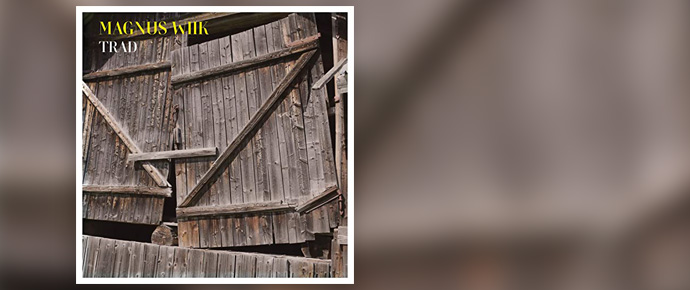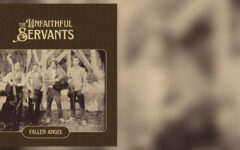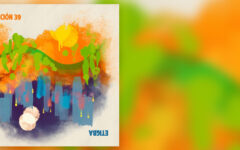
Many readers will know that Norway is most famous for its beautiful scenery and spectacular light show, but pair that with progressive bluegrass/old time music and not only is it a recipe for stunning success, but one with a story behind it. Magnus Wiik takes us on a journey with his newest solo album, Trad, recorded in his home village of Rauland. Wiik, having studied jazz guitar at Trondheim conservatory and Jazz Performance & Improvised Music at the Norwegian Academy of Music in Oslo, describes himself as falling “head over heels” with the traditions and sounds of bluegrass and Irish folk music.
Over the years he has recorded seven albums as a leader or co-leader, six of which heavily feature his compositions, as well as doing his fair share of sideman work. In 2015 Magnus received the Geir Digernes’ Memorial Prize for his musicianship, and since then has toured extensively in Norway, Denmark, Ireland, Japan, Canada, Europe, Tunisia and the home of bluegrass, the USA.
Trad, which is part two of a double solo-album (along with the first release Rad), finds him encapsulating the progressive youthful sounds and energy of players such as The Punch Brothers, Jake Jolliff, or Billy Strings. This collection of music contains nine traditional songs and tunes that will likely be familiar to any avid bluegrass listener/folk fan, and even rock fans! Wiik describes his choice of material for this album to be those that are dear to his heart, helping to shape his perspective of trad music whatever genre you are coming from.
What really struck me about this album upon my first listen was the fact that Wiik plays all of the instruments to a very impressive level. It is really not very often that you find someone doing not only that, but arranging as wide an array of material as he has done. Throughout the album, Wiik is featured on guitar, fiddle, banjo, mandolin, dobro, bass, cello, flute, and keys, as well as lead vocals. All of these recordings have elements of multiple textures and flavors that he brings to each instrument on track.
The album kicks off with a very clear nod to the bluegrass and folk heritage with a strong yet hauntingly melancholic version of the classic murder song, Wild Bill Jones. The next track moves us swiftly on to the progressive bounty of this album, with a beautiful flowing version of the Armenian Jazz Pianist Tigran Hamasyans tune, Vardavar. The different rhythmic textures and performances throughout this track caught my attention, particularly the intricate rolling banjo pattern towards the start of the track. Butcher Boy quickly brings us back to the folk realm of murder songs, with the instrumentation featuring tasteful guitar and bass playing entwined with the saddening story of this old English folk song.
Sugar Babe rolls us back into the progressive bluegrass world, with Wiik’s full band version of this classic, starting out straight ahead on a wide boulevard but then taking us into welcomed improvised avenues. Wiik’s reimagined version of the The Cuckoo pays homage to the ominous traditional melody, whilst drawing inspiration from the sounds of Crooked Still or The Punch Brothers. Elliotts Waltz sets sail into an excerpt of Elliott Smiths Waltz #1, alongside Wiik’s own added composition. It features Wiik’s on keys throughout, with elements of mandolin, guitar, and bass thrown in.
It is not until we arrive at War Pigs that we realize the diversity of styles and instrumentation involved on this album with Wiik’s take on this Black Sabbath protest number. Dobro, banjo and guitar are featured heavily throughout this track, alongside doubled vocals, to create a full and gritty sound.
Tuttles effortlessly brings us back to the fiddle world, with a set of three tunes, the old time number Nine Miles out of Louisville and the popular Irish reels Tuttles and The Chicago Reel. Wiik’s performance of these tunes reflects sounds from the well-loved Transatlantic Sessions, effortlessly weaving the dobro with the Irish traditional flute, fiddle, and rhythm guitar.
The last track of the album, Dun Do Shuil (Close your Eyes), leaves us with an old Irish Gaelic lullaby. Wiik’s choice of haunting instrumentation and vocal layering echo the history and tragic truths of this song. We can be somewhat sure that the words date back to the Irish potato famine, a mother’s lullaby to her cradled child with the promise that father will bring back food.
After listening to this album, a couple of things stuck with me. First, even though Wiik is playing all of the instruments on this record, the cohesive chemistry on each track would make you believe it was a full band of different players that had recorded it live. Secondly, the multiple styles and his movement between genres is done with ease, and delivered with consistency between each track, which makes it refreshing and exciting for the listener.
For more information on Magnus Wiik, visit his website. His albums are available through a number of music retailers.







